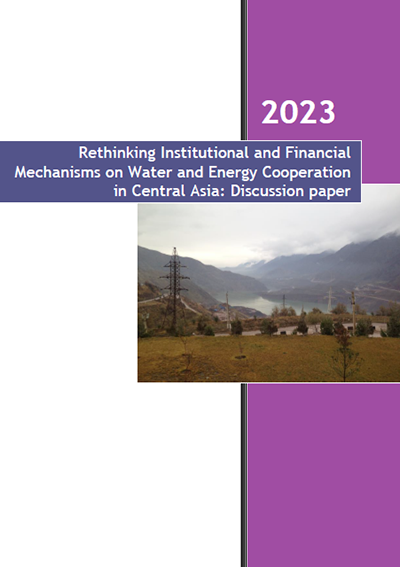Activity
Research: Rethinking Institutional and Financial Mechanisms on Water and Energy Cooperation in Central Asia: Discussion paper
Authors: Ziganshina D.R., Sorokin A.G., Muminov Sh.Kh., Shamsiev Kh.A.
Contributing experts: Prof. Ibatullin S.R., Ryabtsev A.D., Uzakbaev Ch.M., Prof. Pulatov Ya.E., Mamedov B.K., Sokolov V.I.
Water and energy management is closely interlinked and has been a key factor of inter-state relations among the Central Asian countries since their independence in the early 1990s. Over the 30 years of independence, the Central Asian countries have made continuous and constructive progress in cooperation on natural resource management, including through joint work under institutions such as the International Fund for saving the Aral Sea (IFAS), the Interstate Commission for Water Coordination (ICWC), the Interstate Commission on Sustainable Development (ICSD) and the Coordinating Dispatch Centre (CDC) “Energy”. Several regional, bilateral and trilateral agreements have been adopted, promoting transboundary cooperation on water and energy, despite ongoing technical and administrative challenges.
The momentum towards greater regional cooperation is increasing. In 2018, the heads of Central Asian countries reiterated the need for strengthening the institutional and legal framework of IFAS, with Kazakhstan suggesting to discuss the establishment of a sustainable regional mechanism for the integrated use of water and energy resources in Central Asia. In July 2022, the Heads of Central Asian states reiterated the importance of strengthening mutually beneficial multilateral cooperation on the integrated and rational use of water and energy resources in the region, considering the interests of all countries in the region.
Following this, the working group on the improvement of legal and institutional structure of IFAS was established in 2018 and continues its mandate till now. Development partners also contributed to the discussion on improved water and energy coordination. The Germany’s Green Central Asia Initiative established a working group on water and energy. The European Union has offered support to Central Asia with environmental issues featuring prominently in its EU-Central Asia strategy and specific projects on regional cooperation and exchange on environment and climate change and dialogues on the water, energy and food nexus. The Eurasian Development Bank published an analytical study that suggests institutional solutions for effective regulation and development of Central Asia’s water and energy complex, including the establishment of an international water and energy consortium (IWEC). The USAID Regional Water and Vulnerable Environment Activity (WAVE) assessed the potential for establishment of an IWEC.
This document intends to contribute to these discussions in four different ways. First, the document is prepared by regional experts and practitioners working on water and energy fields in Central Asia for decades and therefore suggests first-hand information on history, best regional practices, workable mechanisms and shortcomings. Second, it suggests starting with the Central Asian own experience, both positive and negative, on water and energy coordination before turning to international experience and possible revised financial and institutional mechanisms. Third, the paper focusses on the financial mechanisms of water and energy interactions, while acknowledging all other important and interrelated aspects. Finally, the paper does not prescribe any particular solution, it aims to present a range of options to inform dialogue and for further investigation and development.
Rethinking Institutional and Financial Mechanisms on Water and Energy Cooperation in Central Asia: Discussion paper
Download .pdf


